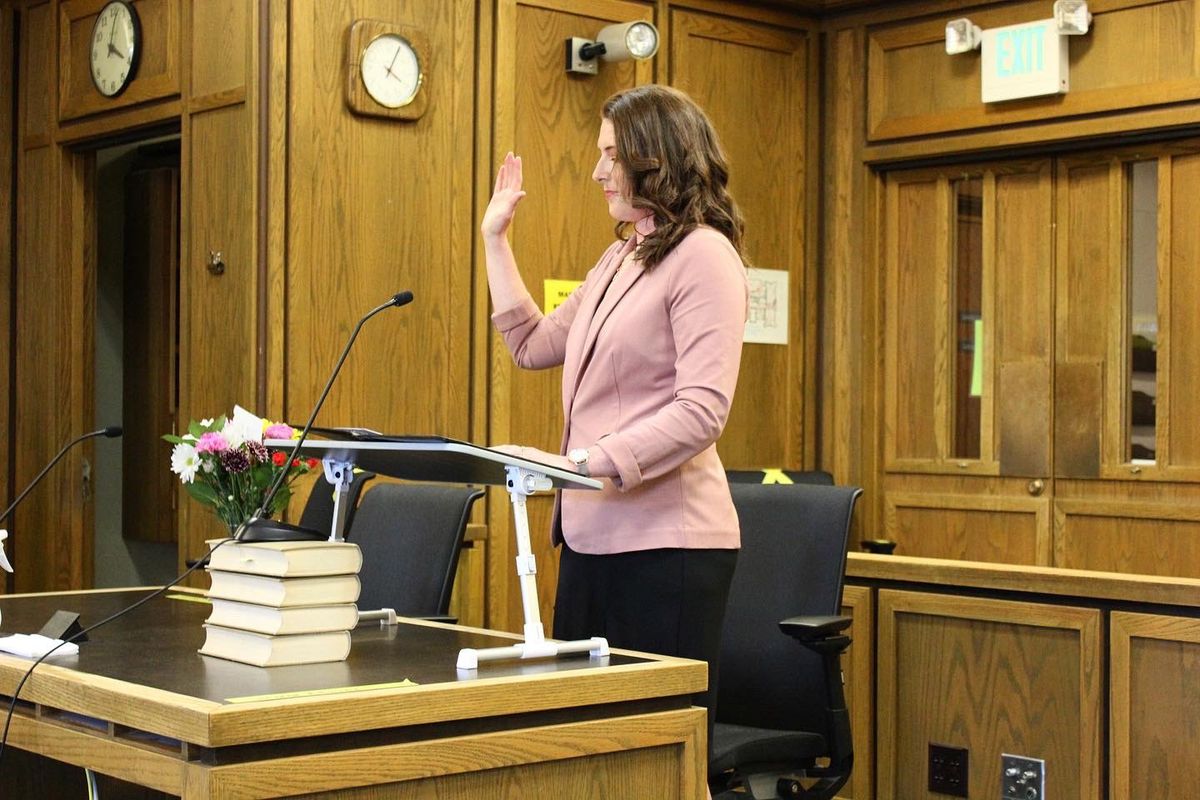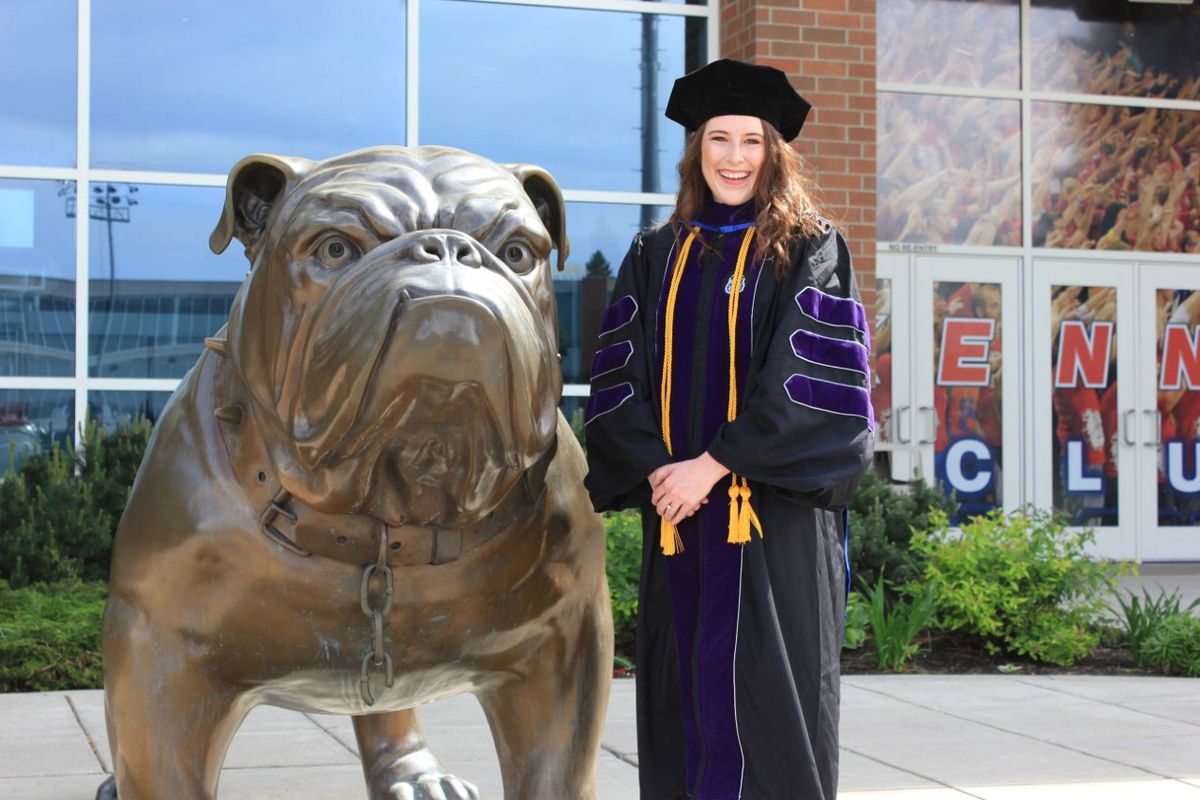Hundreds become lawyers in Washington state without taking bar exam due to COVID-19 exemption
Allison Drescher, who recently graduated from Gonzaga University’s School of Law, recites the Oath of Attorney in Spokane County Superior Court on Monday, July 13, 2020. Drescher, 25, will become a practicing attorney before taking the bar examination, as the Washington Supreme Court recently suspended the test requirement due to COVID-19. Though not required, she plans to take the bar exam in Idaho in February. (Courtesy of Allison Drescher)
As a law student at Gonzaga University, Allison Drescher spent three years preparing for the bar examination – two consecutive days of multiple-choice questions and complicated essay prompts that test not only the legal wit of aspiring lawyers but also their mental stamina.
Those two days came and went this week, under unusual circumstances. Fewer than 80 applicants to the Washington State Bar Association took the exam Tuesday and Wednesday at sites in Tacoma and Spokane.
Drescher and hundreds of others opted out, thanks to a state Supreme Court decision to temporarily waive the test requirement due to concerns about COVID-19, including the potential spread of the novel coronavirus among test takers.
Jennifer Olegario, a spokeswoman for the bar association, said 571 applicants chose to receive law licenses through “diploma privilege” – that is, on the merit of their degrees from accredited law schools. Only those who were registered to take the bar exam this week or in September were given that option.
About 50 more people are expected to take the exam in September. The bar association scheduled that second session and split the test groups between Tacoma and Spokane to allow for social distancing.
The Washington Supreme Court decided the state should grant diploma privilege in June following a petition from the faculty of Seattle University’s School of Law.
In a letter to the court, the school’s dean, Annette Clark, wrote that students’ lives had been “turned upside-down” by the pandemic and the civil unrest that followed the “senseless killings” of George Floyd, Ahmaud Arbery and Breonna Taylor at the hands of police.
“Some of our students have said they have trouble sleeping, with the sound of helicopters overhead, the thunder of flash-bang grenades nearby and the stench of tear gas drifting indoors,” Clark wrote. “The emotional toll of the killings is high and taxing the graduates’ ability to effectively prepare for the bar exam.”
Drescher, a 25-year-old from Orondo, Washington, recited the Oath of Attorney at the Spokane County Courthouse on July 13, and soon she will begin clerking for U.S. District Judge Rosanna Peterson in Spokane.
Though not required, Drescher plans to take the bar exam in Idaho in February. In part, she said, she wants the pride and satisfaction of passing a test she’s spent years preparing for. But she’s also concerned about her ability to progress as a lawyer because some in the field might not take her seriously if she hasn’t passed the exam.
“In my own opinion, I think what I do after law school and in my work will speak for itself. But I just don’t want to have any question marks next to my name,” she said. “You do have those people who are adamant in thinking that it’s a rite of passage that every young lawyer should have to accomplish.”
Drescher emphasized that law licenses are not “just being handed” to those who receive diploma privilege.
In addition to law school, Drescher last year passed a legal ethics test called the Multistate Professional Responsibility Examination. Last week, she took another required test featuring 60 multiple-choice questions on Washington state law. The bar association also conducts thorough background checks to review the “character and fitness” of each applicant.
“I think the layperson may not really understand just how rigorous the three years of legal education are, and just how difficult it was to focus in the middle of a pandemic for a test of this degree,” Drescher said. “It’s really unprecedented, and I think that’s why the Supreme Court took unprecedented action.”
The decision to waive the exam requirement was controversial in legal communities, with some stressing the need to uniformly measure the abilities of every new attorney.
Sara Maleki, a personal injury attorney who earned her law degree from Gonzaga in 2009, said she recognized the value of the bar exam while preparing to try her first case. The “mental marathon” of the test not only ensures new attorneys are familiar with certain areas of the law; it also gives them a sense of the endurance needed to work effectively, she said.
“If they’re going to look at two candidates with equal credentials, but one has passed the bar and the other one hasn’t, I have to think most firms will be more interested in the candidate that took and passed the bar,” Maleki said. “I also have to think that most people would want to hire a lawyer who passed the bar.”
Gonzaga law professor Ann Murphy, who specializes in tax law and civil procedure, supports the decision to grant diploma privilege.
Murphy noted that bar exams varied greatly by state until the 1970s, when the American Bar Association developed a uniform version used in many jurisdictions. The scores required to obtain a law license still vary by state. Wisconsin has always granted diploma privilege to graduates of Wisconsin law schools.
Moreover, the bar exam is plagued by many of the same problems and inherent biases as other standardized tests, said Murphy, who began teaching at Gonzaga in 2000.
“What it really, really favors is memorization. And as a lawyer, are you really going to memorize everything about a case? No,” Murphy said.
“It favors white people, and so white people tend to do better,” she added. “Those from low-income or minority communities do worse, and I’ve noticed that over 20 years. It’s really unfortunate because those students have done really well. They just don’t test as well.”
Just over 73% of accredited law school graduates passed the bar exam in Washington in July 2019. Exactly half passed the exam this February.
Murphy noted the exam is expensive, too. The test itself costs hundreds of dollars, and most graduates take a weeks-long preparation course after law school.
More than any test, Drescher said she highlights her experience as a clerk in Spokane County Superior Court and as an intern at a local law firm.
“Those experiences gave me real-world practical experience that a standardized test does not give you,” Drescher said. The bar exam, she said, measures “how much can you learn and memorize and conform to the standards that the bar exam graders want to see.”

